Custom MHC
Contact us to request a custom MHC with choice of allele, peptide, monomer/tetramer, etc.
KACTUS peptide-ready MHCs (prMHC) are MHC monomers and tetramers absent of antigenic peptides. The prMHCs are stabilized and ready for loading the neoantigen peptide of your choosing. They are ideal for generating custom MHC peptide tetramers and high throughput peptide screening. The prMHCs are expressed from HEK293 cells and have >95% purity.
KACTUS offers a quick and simple protocol for loading peptides in-house. Contact us to receive the protocol.
Enabling rapid and high-quality creation of custom Class I and II MHC tetramers, our Peptide-Ready MHCs (prMHC) provide a streamlined and user-friendly approach to developing new custom MHC monomers and tetramers in just a few minutes directly in your lab. Simply by mixing your peptide of interest with one of our prMHCs and incubating at room temperature, you generate a Peptide-MHC complex, which can be utilized for the creation of custom MHC tetramers and monomers or employed in high-throughput screening of peptides. This innovative system holds applications across various realms including epitope discovery, neoantigen vaccine research, and verification of T cell staining, among others.
In neoantigen identification, assessing the immune functionality of the antigenic peptide is critical, which includes evaluating its binding affinity to MHC and its reactivity with TCR. To facilitate this, KACTUS has introduced a range of functional Peptide-Ready MHCs products. These can serve as a ready-to-use loading system to assist in loading antigen peptides and subsequently form a new, complete MHC peptide complex, thereby significantly aiding your neoantigen
research studies by ensuring efficiency and reliability.
prMHCs are instrumental in the functional screening of peptides for MHC class I binding, a critical component in vaccine design and immune monitoring. They provide the distinct ability to discriminate between MHC binding and non-binding peptides, which is particularly pivotal when screening immunogenic peptides derived from infectious agents or cancer neoantigens. Subsequently, the generated Peptide-MHC complexes can be used for immune monitoring.
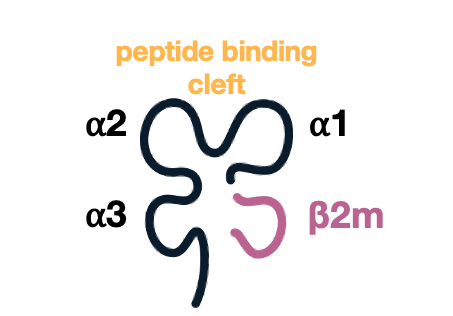
Class I Peptide-Ready MHC (prMHC).
Browse available alleles in our stabilized peptide-free form.
KACTUS supports expression of other MHC alleles including class II alleles and non-human species. Submit our custom MHC form to request an allele not listed above.
To order a prMHC product online, browse available products and add to cart to pay online via credit card.
To pay via PO, send your order information to orders@kactusbio.us.
Submit our custom MHC form to request a a custom pMHC or prMHC.
Contact us to request a standard or bulk quote, or for more information.
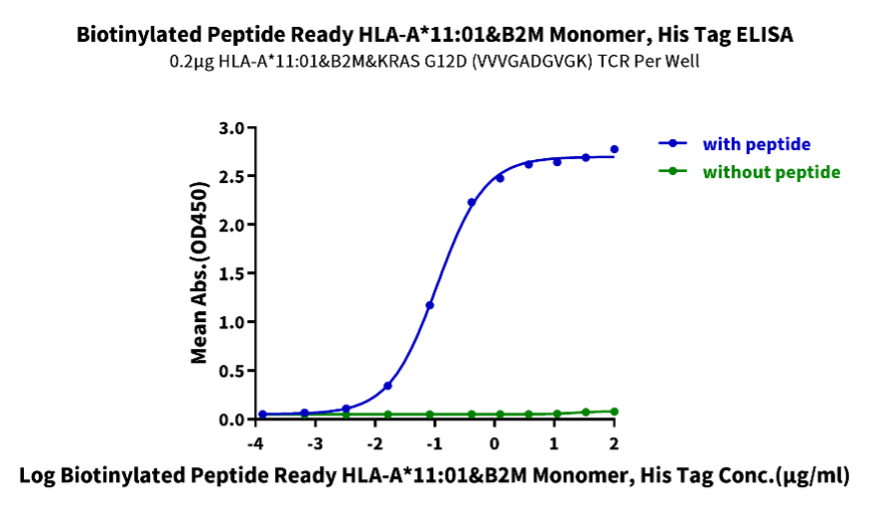
Figure 1. Demonstrated via ELISA assay, biotinylated Human Peptide Ready HLA-A*11:01&B2M Monomer loaded peptide (VVVGADGVGK) has a high affinity with HLA-A*11:01&B2M&KRAS G12D TCR. The EC50 is 110 ng/mL.
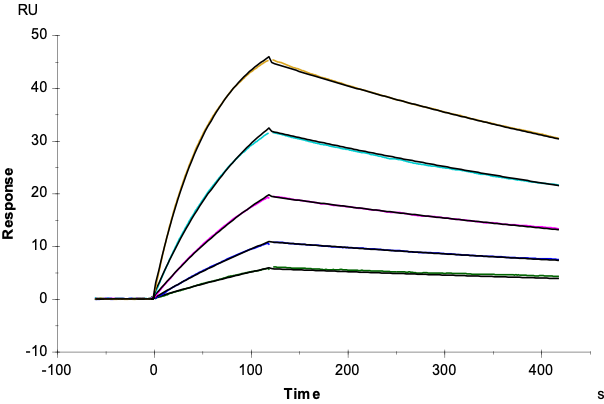
Figure 2. Demonstrated via SPR assay, biotinylated Human Peptide Ready HLA-A*11:01&B2M Monomer loaded with peptide (VVVGADGVGK) has a high affinity with HLA-A*11:01&B2M&KRAS G12D TCR. The affinity constant is 8.5 nM.
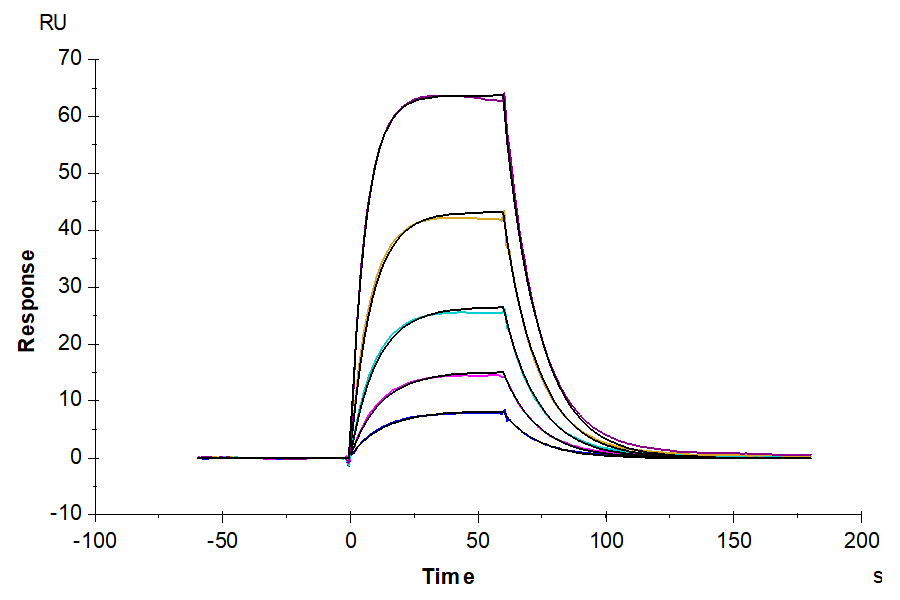
Figure 3. Demonstrated via SPR assay, Human Peptide Ready HLA-A*02:01&B2M& Monomer loaded with peptide (FMNKFIYEI) has a good affinity with HLA-A*02:01&B2M&AFP TCR. The affinity constant is 0.32 µM.
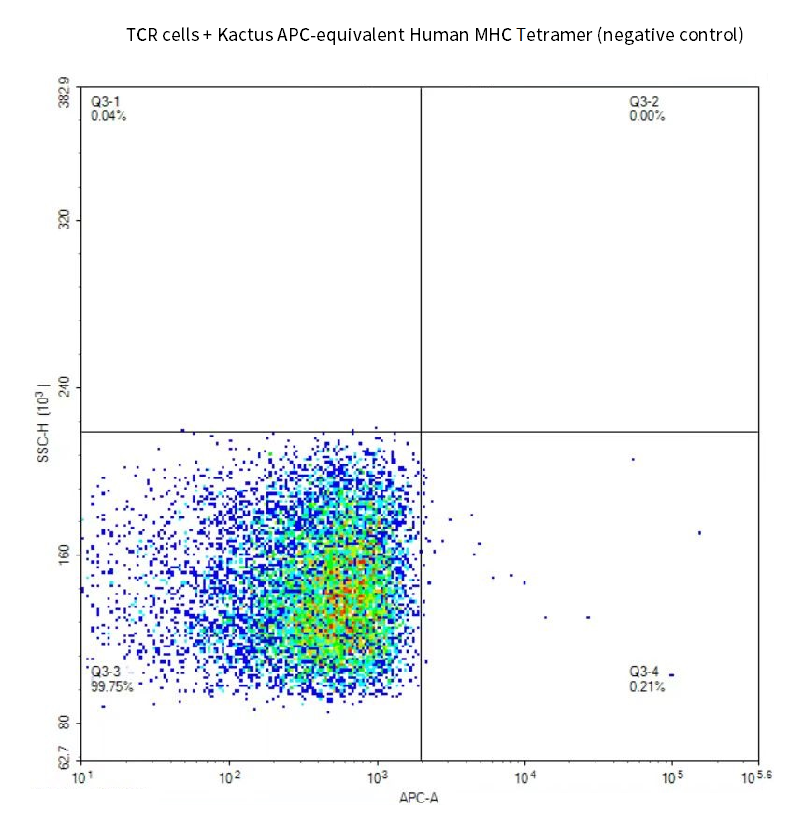
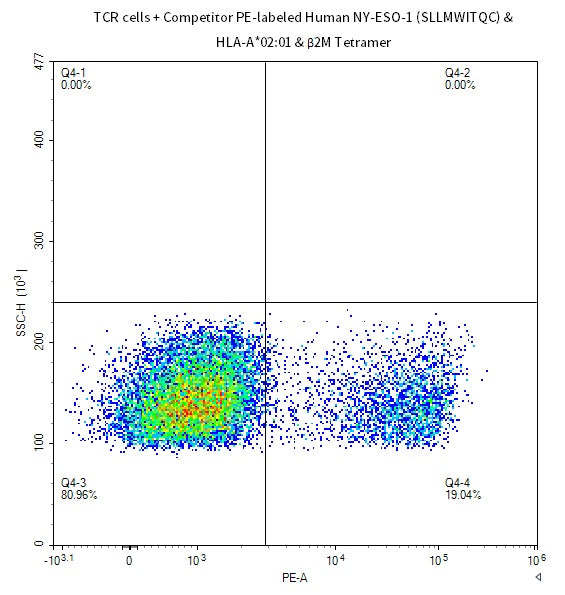
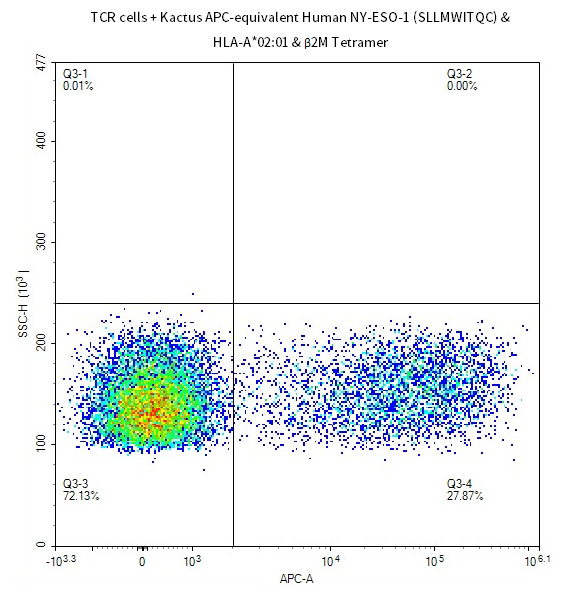
Figure 4. Demonstrated via FACS assay, fluorescent-labeled Human Peptide-Ready HLA-A*02:01&B2M Tetramer loaded with peptide (SLLMWITQC) can bind with HLA-A*02:01&B2M&NY-ESO-1 TCR cells.
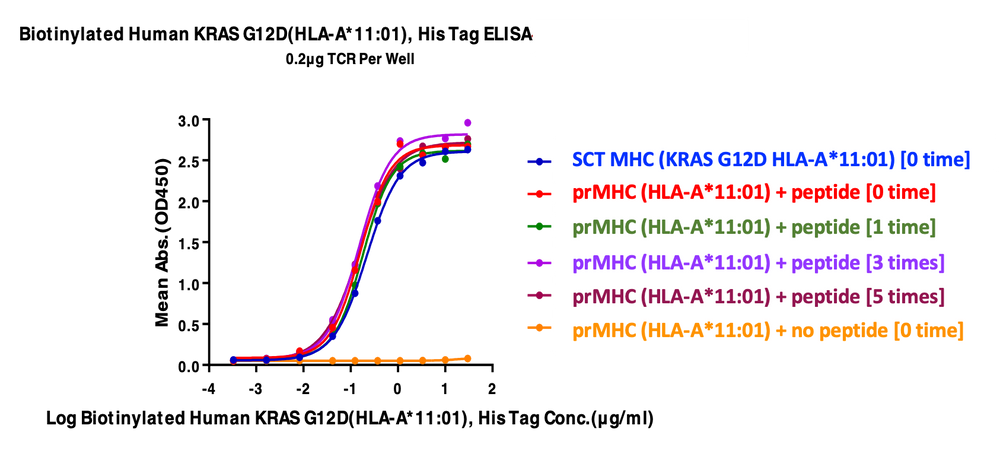
KRAS G12D peptide was added to biotinylated human HLA-A*11:01 and freeze thawed up to five times. Activity was analyzed via ELISA. Immobilized TCR was added to the plate at 2μg/mL (100μL/well). Results are a dose response curve for Biotinylated
Human KRASG12D (HLA-A*11:01), His Tag with EC50s of 0.22/0.16/0.18/0.15/0.15/19 μg/mL.
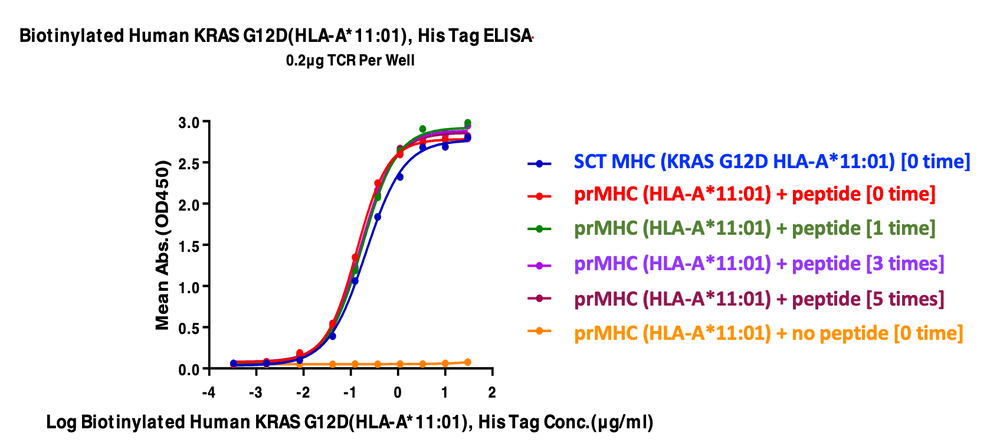
Biotinylated human HLA-A*11:01 was freeze-thawed up to five times after which KRAS G12D peptide was added. Activity was analyzed via ELISA. Immobilized TCR was added to the plate at 2μg/mL (100μL/well). Results are a dose response curve for Biotinylated Human KRASG12D (HLA-A*11:01), His Tag with EC50s of 0.21/0.13/0.18/0.16/0.16 μg/mL.
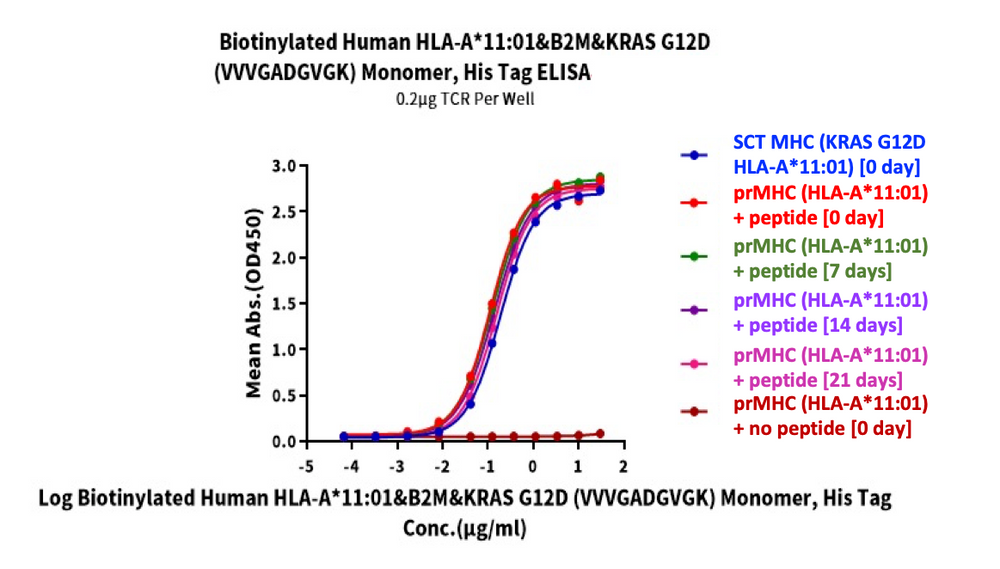
KRAS G12D peptide was added to biotinylated human HLA-A*11:01 and incubated at 4℃ for 0, 7, 14, and 21 days. Activity was analyzed via ELISA. Immobilized TCR was added to the plate at 2µg/mL (100µL/well). Results show a dose-response curve for Biotinylated Human HLA-A*11:01&B2M&KRAS G12D (VVVGADGVGK) monomer, His Tag with EC50s of 0.19/0.11/0.13/0.14/0.16 µg/mL.
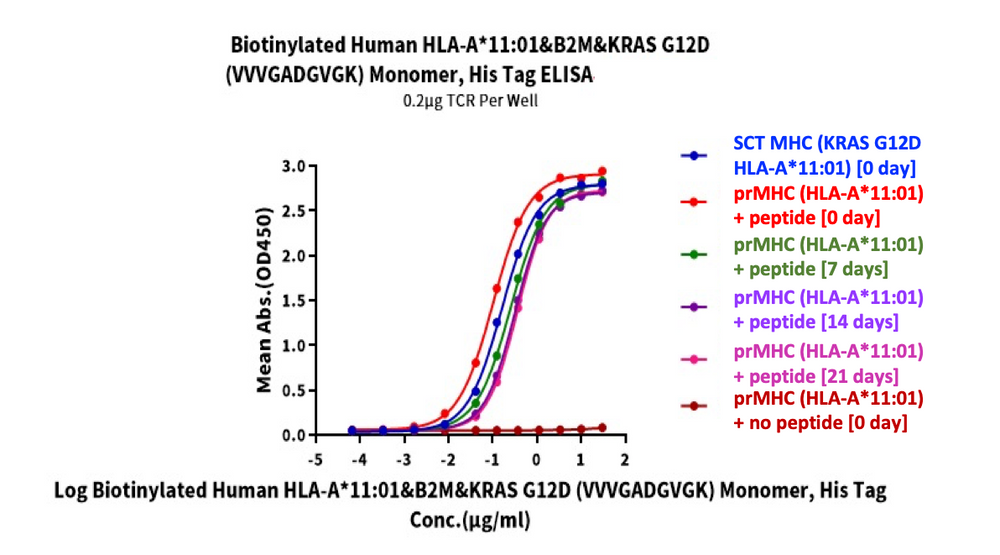
Biotinylated human HLA-A*11:01 was incubated at 4°C for 0, 7, 14, and 21 days, after which KRAS G12D peptide was added. Activity was analyzed via ELISA. Immobilized TCR was added to the plate at 2µg/mL (100µL/well) on the plate. Results show a dose-response curve for Biotinylated Human HLA-A*11:01&B2M&KRAS G12D (VVVGADGVGK) monomer, His tag with EC50s of 0.16/0.11/0.26/0.32/0.36 µg/mL.
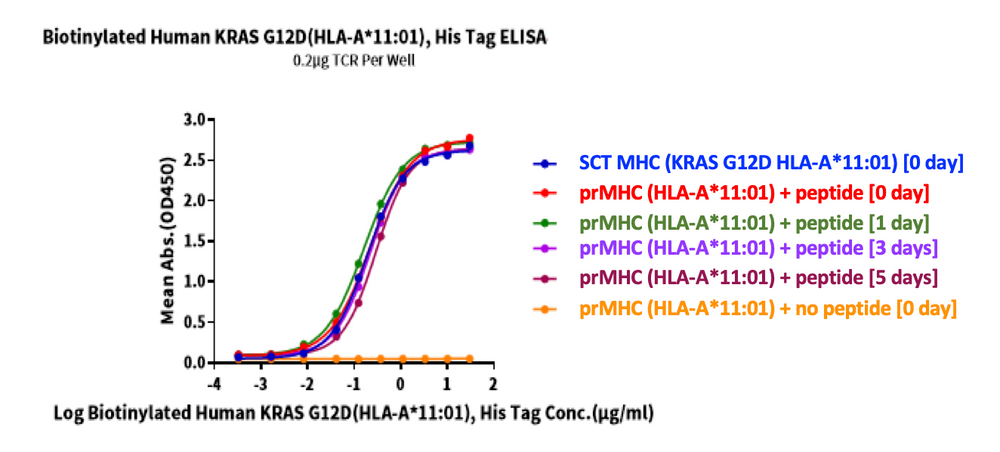
KRAS G12D peptide was added to biotinylated human HLA-A*11:01 and incubated at 37℃ for 0, 1, 3, and 5 days. Activity was analyzed via ELISA. Immobilized TCR was added to the plate at 2µg/mL (100µL/well). Results show a dose response curve for biotinylated human KRAS G12D (HLA-A*11:01), His tag with EC50s of 0.19/0.22/0.16/0.22/0.29/10.56 µg/mL.
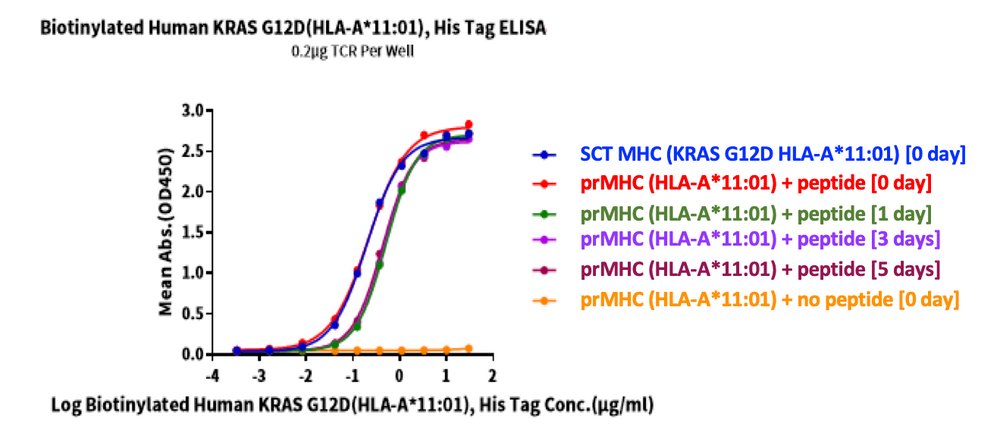
Biotinylated human HLA-A*11:01 was incubated at 37℃ for 0, 1, 3, and 5 days, after which KRAS G12D peptide was added. Activity was analyzed via ELISA. Immobilized TCR was added to the plate at 2µg/mL (100µL/well). Results show a dose-response curve for Biotinylated Human KRAS G12D (HLA-A*11:01), His tag with EC50s of 0.19/0.22/0.52/0.46/0.43 µg/mL.

Identification of the affinity of peptide loaded MHC with TCR [1].
Contact us to request a custom MHC with choice of allele, peptide, monomer/tetramer, etc.
Custom expression of soluble TCR with TCR/MHC binding analysis via SPR.
Browse our catalog selection of MHC peptide complexes.
Learn more about our full portfolio of HLA-G and LILRA/LILRB proteins.
[1] Moritz A, Anjanappa R, Wagner C, Bunk S, Hofmann M, Pszolla G, Saikia A, Garcia-Alai M, Meijers R, Rammensee HG, Springer S, Maurer D. High-throughput peptide-MHC complex generation and kinetic screenings of TCRs with peptide-receptive HLA-A*02:01 molecules. Sci Immunol. 2019 Jul 19;4(37):eaav0860.